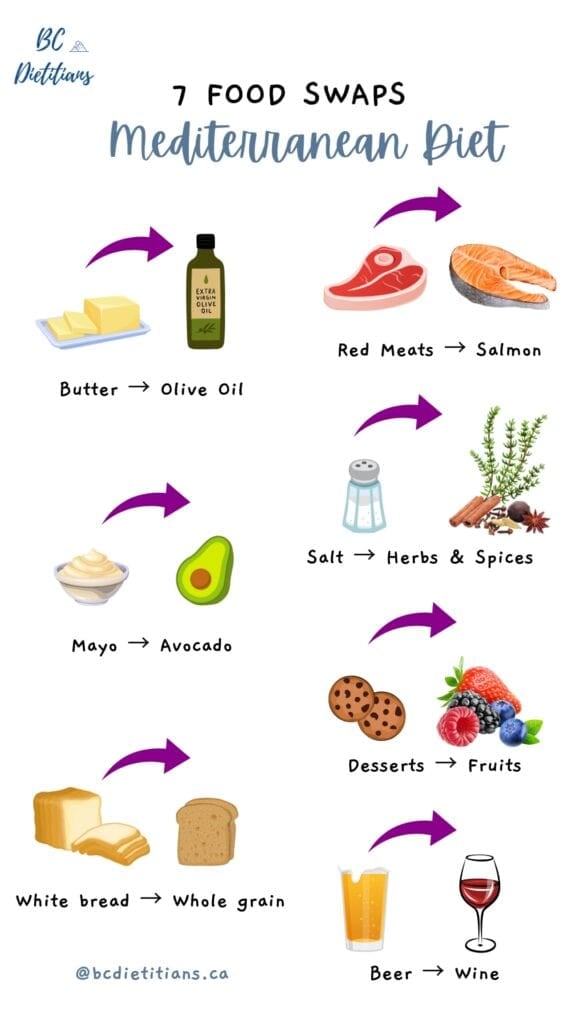Over the years, researchers discovered that individuals who live by the Mediterranean Sea, mostly Greece and Southern Italy, are generally healthier and have lower incidences of chronic health conditions than those living in Northern Europe and North America.
So, what are the secrets of the Mediterranean diet? Keep reading to uncover its benefits and how you can adopt this meal pattern.
What is the Mediterranean diet?
The Mediterranean diet is about the way of eating based upon the traditional diets of the Mediterranean countries, such as Greece, Spain, France and southern Italy.
The Mediterranean eating pattern consists of choosing the right foods rather than counting the calories and looking at the macronutrients consumed. The Mediterranean diet emphasizes the following:
Eat plenty of :
o Vegetables (olives, tomatoes, broccoli, bell peppers, spinach, kale)
o Fruits (blueberries, strawberries, grapes, figs, apples, oranges, peaches, bananas)
o Nuts and seeds (walnuts, hazelnuts, almonds, flaxseeds)
o Legumes (chickpeas, beans, lentils)
o Whole grains (whole wheat bread, oats, barley, brown rice, quinoa)
o Fish (salmon, mackerel, herring, lake trout, sardines, tuna)
Eat moderate amounts of:
- Poultry and eggs
- Low-fat dairy products
Limit eating :
- Red meat (no more than 2 ½ ounces per serving for a few times per month)
- Deli meats
- Refined grains
- Processed foods
- Sweets and desserts
- Beverages with sugar added
The Mediterranean diet also emphasizes healthy unsaturated fats, specifically on:
- Omega-3 fats (fatty fish, flaxseeds)
- Monounsaturated fats (olive oil, canola oil, soybean oil, nuts)
And recommends limiting foods high in saturated fats:
- Animal products (meat and dairy products made with whole milk)
- Plant-based oils high in saturated fats (palm oil, coconut oil)
What are the health benefits of a Mediterranean Diet?
Mediterranean diet for heart health
The Mediterranean style of eating has been studied substantially for its relationship with heart health. Research showed that following this dietary pattern inherently reduces the intake of saturated and trans fats, this decrease the risk of heart disease and stroke by slowing plaque buildup in the arteries. Other studies noted that this diet might improve blood pressure. The 2016 Canadian Cardiovascular Society guidelines provide a strong recommendation for a Mediterranean dietary pattern to lower cardiovascular disease risk based on results of the original PREDIMED study.
Mediterranean diet for weight loss
A meta-analysis investigated the effect of the Mediterranean diet on body weight/weight loss. Sixteen randomized controlled studies with 3,436 participants were included. The average age of participants ranged from 18 to 75 and the study duration ranged from 4 weeks to 5 years.
The Mediterranean diet reduced body weight and BMI compared to control diets, by an average of 1.75 kg and 0.57, respectively.
Mediterranean diet for diabetes
Because the Mediterranean diet encourages consuming plenty of plant-based foods and healthy fats, it may also stabilize blood sugar levels and lower one’s risk for type 2 diabetes.
Mediterranean diet for brain health
And that’s not all; the Mediterranean diet may also benefit older adults, particularly in brain health, by improving one’s memory and attention span and decreasing the risk of Alzheimer’s disease. The MIND diet — is a hybrid of the Dietary Approaches to Stop Hypertension diet (DASH) and Mediterranean diets that is specifically designed to prevent or slow the progression of cognitive decline and promote brain health.
Specifically, the MIND diet comprises beneficial foods, including green leafy vegetables, other vegetables (e.g., green/red peppers, squash, carrots, broccoli, celery, potatoes, tomatoes, peas, beets, corn), berries, nuts, olive oil, whole grains, fish, beans, and poultry; and excludes detrimental foods, including butter/margarine, cheese, red meat and other processed meats, fried fast foods, and pastries and sweets.
7 Simple Mediterranean Diet Ideas

You can adopt the Mediterranean style of eating by including certain types of foods. Here are seven easy food swaps with meal ideas to get you started:
- Butter → Olive Oil
Olive oil is the cornerstone of the Mediterranean-style diet. Rich in monounsaturated fats, consuming olive oil regularly may be linked to a healthier heart. Make your vegetables extra appetizing by drizzling them with olive oil.
2. Mayonnaise → Avocado
Like olive oil, avocado has an abundance of monounsaturated fats. Consider the famous west-coast mashed avocado toasts as a Mediterranean breakfast to start your day with healthier fats.
3. White bread → Whole grain bread
Whole grain breads are packed with fibre, making you feel full and slowing down the absorption of sugars, stabilizing your blood sugar level.
4. Red meat → Salmon
Eating fish, particularly fatty fish, at least twice a week may lower the risk of heart disease and other chronic health conditions.
5. Salt → Herbs and spices
The Mediterranean diet recommends the use of herbs and spices. These naturally flavorful ingredients enhance your dishes without raising your blood pressure.
6. Sweet Snacks and Dessert → Fresh and frozen fruits
Eating sweets snacks and desserts once in a while is certainly alright, but if you have a sweet tooth, grab a nutrient-dense whole fruit or a bowl of unsweetened, frozen fruits for a quick Mediterranean snack instead.
7. Beer → Red wine
The Mediterranean diet does not explicitly recommend alcohol. However, moderate alcohol intake — in particular, red wine consumed with meals — is a recognized part of the dietary pattern. A glass of wine would be the preferred choice than a can of beer. Thanks to the flavonoids present in red wine, a type of antioxidant that may have cholesterol-lowering properties.
Don’t go overboard with your red wine, though; moderation means no more than one five-ounce glass for women and two glasses for men each day.
Mediterranean Diet for Beginners
There are no hard and fast rules on following the Mediterranean diet as this diet is all about the eating pattern. Just because the diet originated from the Mediterranean, it does not mean that you should exclude traditional foods from your culture. Instead, it is essential to understand the pattern and swap out foods for foods that you prefer.
If you are unsure which foods to substitute and include, connect with one of our registered dietitians to find out how to follow the Mediterranean meal pattern with your preferred food choices.
Bottom line
The Mediterranean diet is about the way and the types of foods you eat. Following this eating style may promote many positive health outcomes by reducing the risk of chronic conditions, especially heart disease. To reap the potential health benefits from the Mediterranean diet, talk to one of our registered dietitians to support you achieve your health goals.
Blog Contributors:
Amy Chow, Registered Dietitian
Novella Lui, Registered Dietitian
References
Definition of a Mediterranean Diet: A Literature Review. https://www.ncbi.nlm.nih.gov/pmc/articles/PMC4663587/. Accessed on November 25, 2021.
Mediterranean Diet. https://www.healthlinkbc.ca/health-topics/aa98646. Accessed on November 25, 2021.
Mediterranean Diet, Cognitive Function, and Dementia: A Systematic Review of the Evidence. https://www.ncbi.nlm.nih.gov/pmc/articles/PMC5015034/. Accessed on November 26, 2021.
Mediterranean Diet Effects on Type 2 Diabetes Prevention, Disease Progression, and Related Mechanisms. A Review. https://www.ncbi.nlm.nih.gov/pmc/articles/PMC7468821/. Accessed on November 26, 2021.
The Effect of a Mediterranean Diet on Hypertension: A Systematic Review and Meta-Analysis. https://pubmed.ncbi.nlm.nih.gov/26483006/. Accessed on November 26, 2021.
The Impact of the Mediterranean Diet on the Cognitive Functioning of Healthy Older Adults: A Systematic Review and Meta-Analysis. https://pubmed.ncbi.nlm.nih.gov/28710144/. Accessed on November 26, 2021.
The Mediterranean Diet and Cardiovascular Health. https://pubmed.ncbi.nlm.nih.gov/30817261/. Accessed on November 25, 2021.
The Mediterranean Diet: From an Environmental-Driven Food Culture to an Emerging Medical Prescription. https://www.ncbi.nlm.nih.gov/pmc/articles/PMC6466433/. Accessed on November 25, 2021.
Wine Flavonoids in Health and Disease Prevention. https://www.ncbi.nlm.nih.gov/pmc/articles/PMC6155685/. Accessed on November 26, 2021.







Add a comment